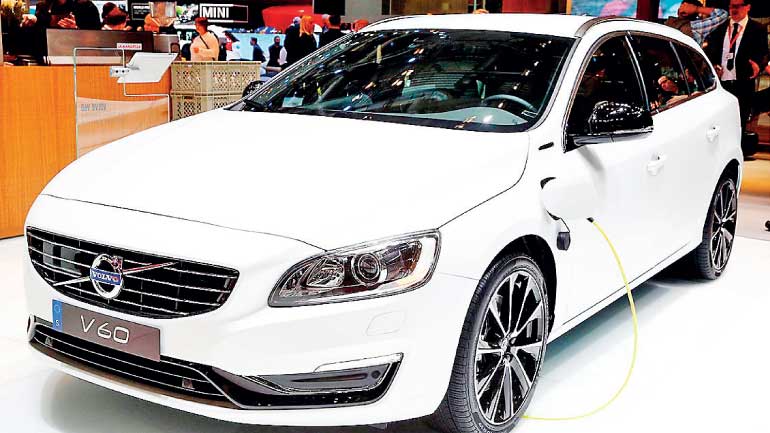Wednesday Feb 25, 2026
Wednesday Feb 25, 2026
Monday, 29 May 2017 00:16 - - {{hitsCtrl.values.hits}}
 Volvo's V60 D5 Twin Engine Special Edition diesel hybrid at the Geneva auto show in March 2015 - Photo credit: REUTERS
Volvo's V60 D5 Twin Engine Special Edition diesel hybrid at the Geneva auto show in March 2015 - Photo credit: REUTERS
Reuters: Swedish carmaker Volvo’s latest generation of diesel engines could be its last as the cost of reducing emissions of nitrogen oxide is becoming too much, Chief Executive Hakan Samuelsson was quoted as saying.
“From today’s perspective, we will not develop any more new generation diesel engines,” Samuelsson told German’s Frankfurter Allgemeine Zeitung in an interview.
However, a Volvo Cars spokesman said Samuelsson had been discussing options rather than a firm plan to stop the further development of diesel engines.
Samuelsson later said in a statement emailed to Reuters he believed diesel would still play a crucial role in the next few years in helping the company meet targets to reduce emissions of carbon dioxide, being more fuel-efficient than petrol engines.
“We have just launched a brand new generation of petrol and diesel engines, highlighting our commitment to this technology. As a result, a decision on the development of a new generation of diesel engines is not required,” he said.
In the FAZ interview Samuelsson said Volvo would continue improving the current range, first introduced in 2013, to meet future emissions standards, with production likely to go on until about 2023.
And until 2020 he said diesel would be needed to help meet carbon dioxide emission limits set by the European Union, but after that other regulations would come into play, with the costs of making engines compliant with ever higher anti-pollution standards meaning it would no longer be worth it.
Instead, Volvo will invest in the electric and hybrid cars, with its first pure electric model due on the market in 2019.
“We have to recognise that Tesla has managed to offer such a car for which people are lining up. In this area, there should also be space for us, with high quality and attractive design,” Samuelsson said.
Samuelsson has previously said that tighter emissions rules will push up the price of diesel-engined cars to the point where plug-in hybrids will become an attractive alternative.
The average carbon dioxide emissions limit for European carmakers’ fleets will need to fall from 130 grammes per kilometre to 95 grammes in 2021, forcing them to invest more in exhaust emissions technology.
Diesel cars account for over 50% of all new registrations in Europe, making the region by far the world’s biggest diesel market. Volvo, owned by China’s Geely, sells 90% of its XC 90 offroaders in Europe with diesel engines.
The scandal over Volkwagen’s cheating of US environmental tests to mask emissions of nitrogen oxides, which can cause or aggravate respiratory disease, means manufacturers are facing intense scrutiny over the true level of pollutants being emitted by their cars.
Goldman Sachs believes a regulatory crackdown could add 300 euros ($325) per engine to diesel costs that are already some 1,300 euros above their petrol-powered equivalents, as carmakers race to bring real NOx emissions closer to their much lower test-bench scores.